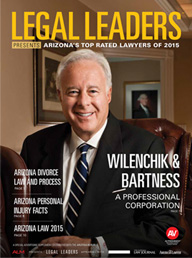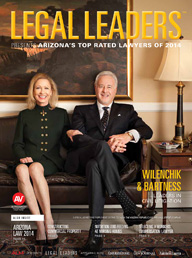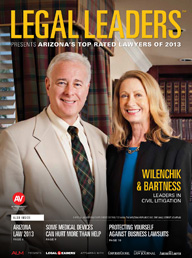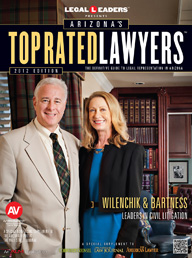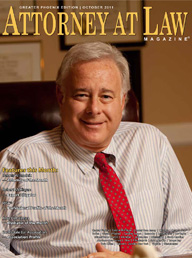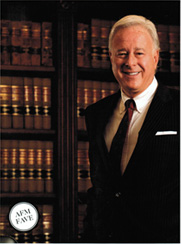8-22-12 Lando Voyles
Lando Voyles is the "Law" in the "Law and Order" team running for election in Pinal County. He is running for county attorney along with Sheriff Paul Babeu, who is running for re-election as Sheriff. Mr. Voyles has tried over 80 cases as a prosecutor in Maricopa County, has experienced fighting the cartels first-hand and knows what it takes to get tough on crime.
Firm Wins Motion to Dismiss $100K Tax Deficiency Case
Wilenchik & Bartness attorney Jack Wilenchik won a Motion to Dismiss a $100,000 tax deficiency in Utah federal district court, and attorney's fees under IRC 7430. Mr. Wilenchik argued that under IRC 6502 the government has ten years to collect a tax after it has been assessed, and that period had expired. In response, the government incorrectly argued that the period had been extended by a settlement agreement between the Defendant and the government. The Court agreed with Wilenchik and Bartness and ordered the suit dismissed.
8-15-12 Sheriff Paul Babeu
Sheriff Paul Babeu stops by the studio to talk about why he is still the best darned Sheriff that Pinal County has ever had.
Mediation Styles
Before you decide on a mediator you should make sure to ask him or her to describe his or her mediation style. There are three types of mediation styles: evaluative, facilitative, and transformational. You should consider which of them would best further your goals. Some mediators choose a style and stick to it, but I, among many other mediators, prefer to pick whatever style fits the circumstances. Sometimes this approach results in use of all three styles in a single mediation session. For example, a facilitative style may work at the start of mediation, but a transformational style might be introduced later when it becomes obvious to the mediator that a participant’s prejudices, emotions, or perceptions operate as a barrier to agreement. Finally, a mediator might use an evaluative style to move the participants through an impasse. The process of mediation allows for this kind of flexibility and creativity.Facilitative style. In the early days of mediation, (the late sixties), facilitative mediation was the only mediation being taught and practiced. The function of the mediator is primarily procedural such that he or she is responsible for structuring a process to assist the participants in reaching a mutually acceptable agreement. A mediator trained and practicing in the facilitative style will likely ask questions, request information, validate and normalize participants’ points of view, search for interests underneath the positions and thereby widen the field of possible solutions, and assist the participants in discovering and analyzing potential solutions. The facilitative mediator does not make recommendations to the participants, give his or her own advice or opinion as to the outcome of the case, or predict what a court would do in the case. The mediator is in charge of the process, and the parties are in charge of the outcome.Facilitative mediators hold joint sessions with all parties present so the parties can hear each other’s points of view, but also regularly hold caucuses. (A caucus is when the participants are separated and the mediator assists each party to explore different options). They want the participants, not the attorneys, to have the major influence on whatever agreements are reached.Evaluative Mediation, (sometimes called Directive Mediation). Evaluative mediation involves a process very similar to settlement conferences held by judges. The mediator assists the participants in reaching resolution by pointing out the strengths and weaknesses of the participants’ respective positions, and predicting the verdict an arbitrator or a judge or jury would likely reach. Evaluative mediators might make formal, written recommendations to the participants as to the outcome of the issues. Evaluative mediators are concerned with the legal rights of the participants rather than needs and interests, and evaluate based on legal concepts of fairness. Evaluative mediators may hold an initial session where each of the participants presents its position, but most of the time the participants will be separated and the mediator will participate in the negotiation through shuttle diplomacy. The mediator helps the participants and their attorneys evaluate their respective legal positions and the costs and benefits of pursuing litigation or arbitration. The evaluative mediator structures the process and directly influences the outcome.Evaluative mediation emerged in court mandated or court referred mediation. Attorneys normally work with the court to choose a mediator, (although in some instances the court will appoint a mediator from a list without participant attorneys’ input). A participant attorney is much more active in an evaluative mediation and might meet with the mediator alone or with his or her client. Further, there is an assumption in evaluative mediation that the mediator has substantive expertise or legal expertise in the substantive area of the dispute. Because of the connection between evaluative mediation and the courts, and because of their comfort with settlement conferences, most evaluative mediators are attorneys.Transformative Mediation. Transformative mediation, the newest of the three styles, came about in 1994 with the publication of The Promise of Mediation, by Joseph P. Folger and Robert A. Baruch Bush. Transformative mediation is based on the values of empowerment of the participants and recognition by each of the participants of the other’s needs, interests, values, and points of view. The potential for transformative mediation is that any or all participants or their relationships may be transformed during the mediation. Transformative mediators meet jointly with participants since only the participants can give each other recognition.The values of transformative mediation are similar to those of early facilitative mediation with respect to its interest in empowering parties and transformation. Early facilitative mediators fully expected to gradually transform society with their pro-peace techniques. Modern transformative mediators want to continue the process by allowing and supporting parties in mediation to determine the direction of their own process. In transformative mediation the participants structure both the process and the outcome of mediations, and the mediator follows their lead.Some transformative mediation advocates theorize that win-lose processes such as litigation and arbitration have high-jacked the power of people to meet and make decisions that are in their best interests. Further, many people are barred from court or arbitration processes due to prohibitive costs and lengthy delays. However, with the introduction of a trained neutral party equipped with the tools for facilitating discussions and overcoming barriers and impasses within a safe environment, participants can successfully problem solve at a fraction of the cost of adversarial proceedings with win/lose outcome, and the participants are allowed to pursue the interests that most matter to them.Pros and ConsBoth the facilitative and transformational styles work well when the participates desire or must maintain an ongoing relationship. A divorcing couple with children, an employer and employee, a lender and a borrower negotiating a loan workout, and a manufacturer with a long standing relationship with a supplier are good examples of when transformational and facilitative styles are valuable. The facilitative and transformational styles are also effective in that both styles empower the participants to determine, and take responsibility for, their own outcomes. Detractors opine that facilitative and transformational mediations take too long and often end in no agreement after the first session. They also express concern that outcomes can be contrary to rights and standards of fairness, and mediators using these approaches cannot protect a weaker participant.My next few blogs will consist of examples of real cases in which the mediator used one or a combination of these styles.
Wilenchik & Bartness Defends Pastor Michael Salman, Who was Jailed for Preaching in his Home
Wilenchik & Bartness attorney Jack Wilenchik, who is an affiliate of the Rutherford Institute, is representing Pastor Salman pro bono. Pastor Salman was accused of violating zoning and building codes because he held religious meetings in his home that were attended by around 40 people, all friends and family. Mr. Salman was sentenced to two months in jail (which he is currently serving), a $12,000 fine, and three years of probation, the terms of which say that no more than 12 people can be present in his home.For more information on the case, please visit the Rutherford Institute, or for a fact sheet on the case, click here.
Firm Wins Motion for Summary Judgment in Construction Defect Case
On June 14, 2012, Wilenchik & Bartness prevailed on its motion for summary judgment on behalf of a major homebuilder in a construction defect action. As a result of the motion, the entire action was dismissed. The firm was awarded all its fees and costs related to the claim.
Firm Wins Motion for Summary Judgment
Wilenchik & Bartness recently won a motion for partial summary judgment in Maricopa County Superior Court, successfully dismissing several claims that were brought against its investment banker client The dismissed claims involved allegations of breach of fiduciary duty and breach of an employment contract, and sought to prohibit the client from devoting anything less than 100% of his business efforts to a partnership while he was in its employ.
8-1-12 Martha McSally
Guest Martha McSally, who is running for Gabriel Giffords's former seat in Tucson / CD #2, is the first woman combat fighter pilot. She fought the military on its policy that service women should have to wear Muslim garb in Saudi Arabia and won. She was also John Kyl's advisor on terrorism and defense, has two master's degrees and is a tri-athlete.
8-8-12 Sal Diciccio on Legal-ease
Phoenix Councilman Sal DiCiccio talks about how he managed to organize more than 100 Phoenix construction and development industry professionals to re-write the rules for construction permits in the City of Phoenix. Also on the show: Rebekah Morris from the Arizona Builders Exchange, an online trade paper that focuses on the construction industry.









